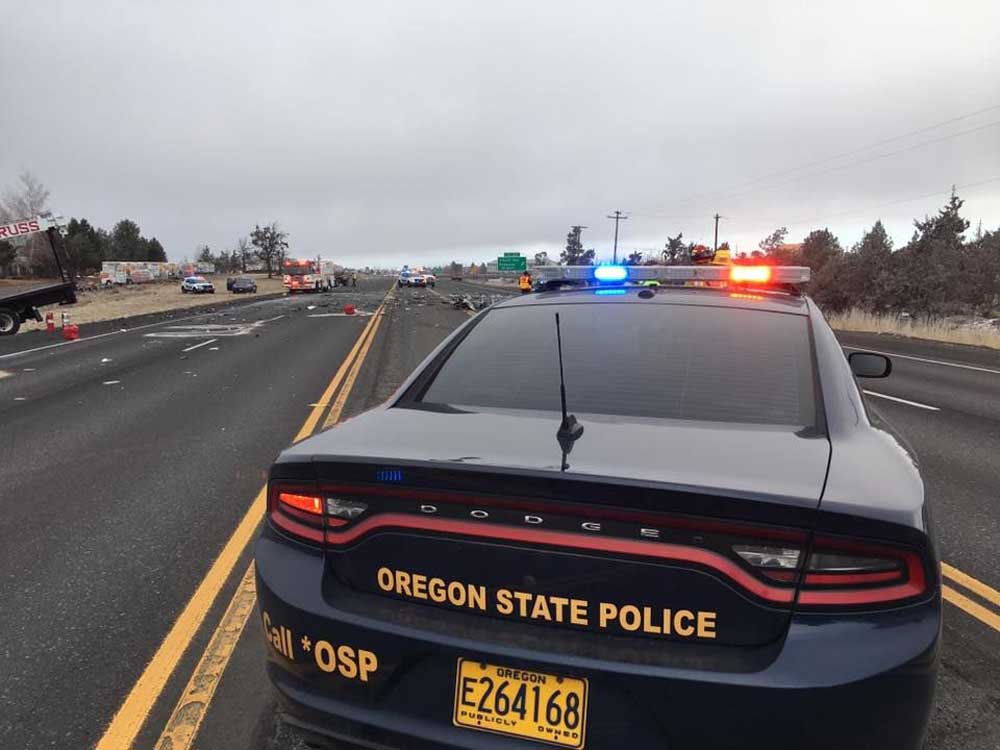Redmond 5 judge faces tough choices
Published 4:00 am Sunday, January 20, 2002
Defense attorneys for five Redmond teens accused of killing Barbara Thomas faced a tough decision.
They needed to ask a judge to throw out the statements their clients made to police in the days after Thomas was found shot to death in her home at 65600 Old Bend-Redmond Highway. But to do so prompted prosecutors to play all the tapes in court last week, presenting the heart of the district attorney?s case to Deschutes County Circuit Court Judge Alta Brady and the public.
?We had to file (motions to suppress the statements),? said David Glenn, attorney for Adam Thomas. ?They did not understand the impact? of waiving their Miranda rights. They didn?t understand they needed a lawyer.?
On those tapes, Seth Koch, 16, describes shooting Thomas in the head with a rifle. And her son, Adam Thomas, 19, tells detectives how he and Koch hit his mom over the head repeatedly with wine bottles before the shooting.
The other teens, Justin Link, 18, Lucretia Karle, 16, and Ashley Summers, 16, also admitted to being present during the planning of the killing and observed it happen. Link, however, said he was joking when he told the others they should kill the woman. He said he left the house and later urged the other two not to kill her.
The publicity surrounding the case will make it harder for the court to find jurors who have not heard about the case, the attorneys said.
?The DA (district attorney) is doing damage to the case by exposing evidence to the potential jury pool,? said Koch?s attorney, Jacques DeKalb.
?They could have played it piecemeal,? added Terry Rahmsdorff, attorney for Karle. ?They could have done a reduced version, but they wanted to try that portion (of their case) in the motion hearings.?
Prosecutors played the videotaped statements during hearings held last month and earlier this month in response to the defense motions.
Attorneys for the five teen-agers challenged the way police arrested and interviewed their clients. They argued before Judge Brady that police never had a good reason to arrest or detain their clients. And after they were arrested, police did not properly notify the teens of their rights and coerced them into talking by befriending them and offering them comfort.
Because police violated their client?s rights, defense attorneys argue, the judge should suppress the statements so prosecutors cannot play them for a jury.
The prosecution, headed up by Chief Deputy District Attorney Darryl Nakahira and Deputy District Attorney Kandy Gies said they are not commenting on the case until it is resolved.
The DA?s office, however, presented the tapes to show detectives properly notified the teens of their Miranda rights and did not coerce them into making the statements, according to court documents.
The judge?s ruling could drastically alter the case.
If Brady allows their statements to be used as evidence, a jury will hear the defendants describe their roles in the killing, and defense attorneys will have a much more difficult time defending their clients.
If she throws the statements out, the defense would be in a much better position. That could prompt some attorneys to seek a plea bargain with the Deschutes County District Attorney?s Office in exchange for their clients? testimony against the other teens.
Defense attorneys would like to get to the plea bargaining table because if convicted as charged, the teens could spend the rest of their lives in prison with little chance of ever getting out.
But so far no plea bargains have been offered.
All five teens are jointly charged as adults with 22 crimes including five counts of aggravated murder. Under Measure 11, they could face life in prison without the possibility of parole.
?We believe all five (teens) are substantially responsible for the murder of Mrs. Thomas,? said Deschutes County District Attorney Michael Dugan in April. ?They?re going to be in jail for a long time, if not the rest of their lives.?
Additional hearings are scheduled for the end of this month and Brady could make a ruling on the statements in February. The trial against the teens is tentatively set for April 9.
Brady said if she rules the statements are admissible, she will hold separate trials for each teen, which could take up to a month per trial. If they are tried separately, the state is requesting Adam Thomas stand trial first, followed by Koch, Karle, Summers and Link, in that order.
To make a decision on whether to allow the statements, Brady must first wade through the following issues:
– Did police have probable cause to arrest the teens.
– Were the teens properly removed from Canada back to the United States.
– Did police properly give them their Miranda rights.
– And, did police coerce the teens into giving their statements.
PROBABLE CAUSE
In December, defense attorneys pointed out that a judge had not issued a warrant for the teens? arrest before they were taken into custody March 27.
DeKalb, Koch?s attorney, said the information Canadian customs and the Whatcom (Wash.) County Sheriff?s Office used to arrest his client failed to identify Koch or any of the other teens as suspects of a specific crime. He said probable cause requires that a single person be identified as committing the crime. Police knew ?a murder was committed,? but they did not know who exactly committed it, DeKalb said.
In response, prosecutors called Deschutes County Sheriff?s Deputy Tim Hernandez and others to show police had good reason to suspect the teens.
Hernandez testified in December that he came upon Barbara Thomas at about 7:30 p.m. while investigating the whereabouts of Koch, Karle and Summers, all of whom were reported as runaways. Hernandez said teens in the Terrebonne area told him on March 26 the three were with Adam Thomas and Justin Link at the Thomas? house.
Upon driving to the Thomas house later that evening, Hernandez found Koch?s parents? Cadillac in the driveway, missing its rear license plate and Barbara Thomas dead inside. Shortly thereafter, police issued an alert on the National Crime Information Center computer saying the teens were suspects in a homicide. That information was put on the Canadian Immigration computer system on March 27.
Oregon State Police Trooper Roberto Robles testified that before the teens were arrested in Canada, he interviewed teen-ager Codi Ridenhour. He said Ridenhour told him Ashley Summers called him from the Thomas? house. Ridenhour told the detective the other four teens were also there at about 5 p.m. the day of the killing, Robles said.
Redmond Detective Tracey Miller testified that he and Bend police Detective Rob Maddox also contacted Lucretia Karle?s younger brother, Ricky, the morning after the killing. Ricky Karle said he had visited his sister, Link, Thomas and Summers at the Motel 6 in Redmond several times during the previous week, Miller testified. Ricky Karle said on March 22, Thomas was upset because he had just had an argument with his mother, Miller testified.
Ricky Karle said Link then pulled out a 9 mm handgun and said, ?I got a round for her,? Miller said. Ricky Karle also told Miller the group talked of going to Canada.
CANADIAN ARREST
The five were first arrested in Canada when the teens, except Thomas, gave false names to Canadian immigration officials and acted strangely at the Sumas, Wash., border crossing.
After Thomas showed officials his license, Canadian officials found a warning on their computer that he and several other teens were suspects in a homicide in Central Oregon.
Defense attorneys say U.S officials did not properly remove the teens from Canada, noting a treaty between the two countries states the U.S. should agree to not seek the death penalty against U.S. citizens before they are returned to this country.
The teens never had a formal process of extradition from Canada, according to defense attorneys. Rather, immigration and customs agents in Canada arrested the teens at the Canadian border and then walked them over to the U.S. with the help of armed U.S. immigration officers.
During a hearing in December, Canadian officials said a formal extradition was unnecessary because the teens had never entered Canada even though they were given ?allowed to leave? forms.
Canadian Customs Inspector Stephen Burnett testified in December that he had the teens park the Honda near a customs office for a secondary examination to see if any prohibited goods had already entered Canada.
Defense attorneys seized on that comment, arguing the teens had clearly been on Canadian soil when they were arrested.
MIRANDA RIGHTS
During interviews with the five teens in Bellingham, Wash., in the late night hours of March 27 and early morning hours of March 28, police clearly read the teens their Miranda rights, the taped statements show. Miranda rights tell individuals they have the right to remain silent and to seek an attorney.
All of the teens said they understood the rights and had no questions.
Defense attorneys for the teens pointed out that police did not ask clarifying questions to further explain their rights and to ensure they were understood.
DeKalb also said Koch was visibly cold and was given a blanket when his rights were read, distracting his attention from their importance. Thomas was visibly shivering at the start of his interview, the tape showed.
In addition, Rahmsdorff, Karle?s attorney, is expected to call an expert witness to testify about juveniles understanding their Miranda rights when hearings resume Jan. 29, according to court records.
If Brady decides the teens? Miranda rights were violated, it could limit what physical evidence prosecutors show a jury. During their interviews, Koch and Thomas led police to the murder weapon hidden in the woods near the Canadian border. Koch also gave his pants and shoes to police, which he said he was wearing during the shooting, after agreeing to a search and seizure and signing a document to that affect.
COERCION
The teens seemed cold during their interviews and were either offered blankets by police or had them when the interviews began.
Defense attorneys pointed out that Bend police Detective Sharon Sweet used endearing words with the teens, such as ?kiddo,? and touched their shoulders while conducting the interviews. Upon cross-examination, Sweet said her speech and touching were not a ploy to extract statements but were her normal mannerisms.
Defense Attorney Rahmsdorff pointed out that Redmond police Detective Tracey Miller told Karle he was there to help her. But Rahmsdorff said Miller was there to extract a statement and failed to even inform his client that she was a suspect and not a witness in the crime.
During the interviews, however, the teens willingly gave statements to police about the crime. They did appear tired during the interviews. And some stated they were tired and even confused at times.








